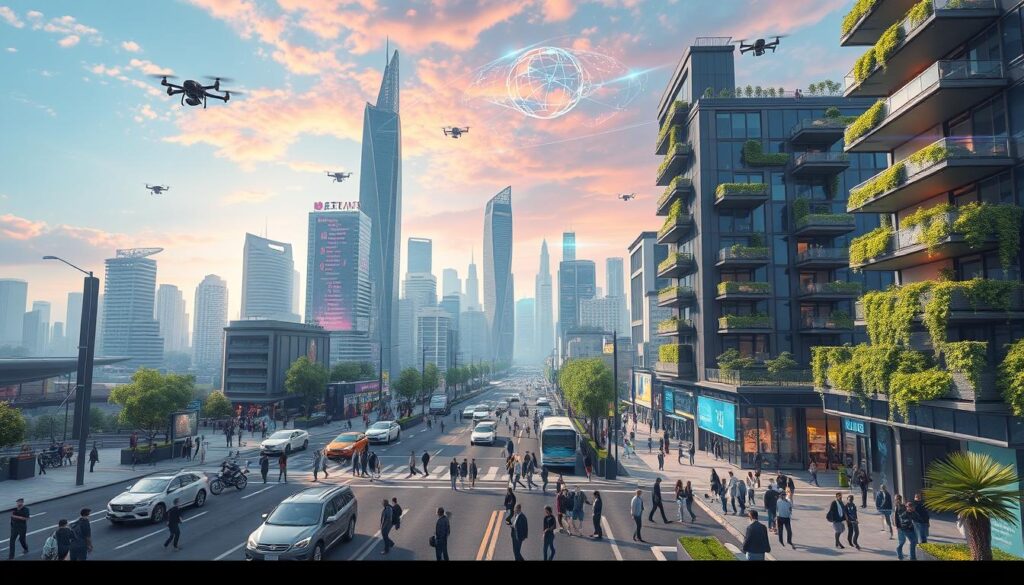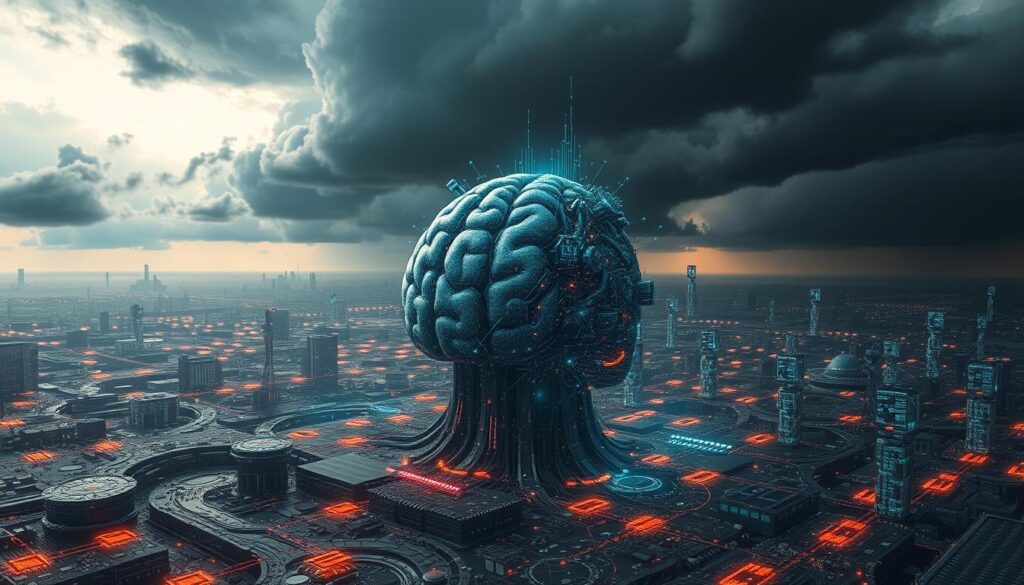Artificial intelligence (AI) is changing our world fast. A recent IBM survey found 42 percent of big businesses are using Artificial intelligence. AI is set to change many industries, making things more efficient and productive.
Artificial intelligence is already making a big impact in healthcare, transportation, education, and finance. It’s automating tasks better and faster than humans ever could.
As more businesses adopt AI, the future looks bright. This article will explore AI in depth. We’ll look at its current uses, new advancements, and how it’s changing society.
Key Takeaways
- Artificial intelligence is rapidly transforming various industries, with over 40% of businesses already implementing AI solutions.
- AI has the potential to automate tasks with greater speed, accuracy, and efficiency compared to humans, boosting productivity and lowering costs.
- AI systems can analyze vast amounts of data to provide valuable insights, aiding in data-driven decision making and process optimization.
- Concerns exist regarding the impact of AI on employment, with the potential for automation to disrupt traditional job roles.
- Ethical considerations and issues related to privacy, security, and accountability are crucial areas to address as AI technology continues to advance.
What is Artificial Intelligence?
Artificial intelligence (AI) is about making machines that can do things humans do, like see, think, learn, and solve problems. It started in the 1950s when scientists tried to make computers smart like us. Now, AI has grown a lot, thanks to machine learning and deep learning. These help machines learn from lots of data.
Understanding the Basics of AI
Machine learning is key to artificial intelligence. It includes many methods like linear regression and neural networks. Neural networks are like the human brain, helping machines think.
Deep learning is a part of machine learning. It uses many layers to make decisions like humans. Generative AI can make new content, like text or images, based on what you ask for.
The History and Evolution of AI
The story of artificial intelligence began in the 1950s. Back then, scientists wanted to make computers smart like us. Over time, AI has grown, thanks to machine learning and deep learning.
In 2024, AI is all about generative AI. It can make new text, images, and videos. Variational autoencoders (VAEs) were introduced in 2013. They let models create different versions of content based on what you ask for.
“The training process for generative AI foundation models requires thousands of clustered GPUs and weeks of processing, typically costing millions of dollars.”
Current Applications of ARTIFICIAL INTELLIGENCE
Artificial intelligence is changing many areas of life and work. It’s making big impacts in business, healthcare, finance, and more. AI is bringing new ideas and making things more efficient.
In business, AI helps with tasks like data analysis and customer service. For example, Amazon uses AI to suggest products to customers. Education sites like Simplilearn use AI to tailor learning plans for students.
Healthcare is also seeing big changes thanks to AI. AI helps with diagnosing diseases and finding new drugs. IBM Watson Health uses AI to analyze medical data, helping doctors make better choices.
Financial companies use AI for spotting fraud and giving investment advice. AI tools are making finance work faster and smarter.
The transportation world is changing too. Self-driving cars are making travel safer and more efficient. AI also helps manage traffic, like Google Maps does, to reduce jams.
The media and entertainment fields are using AI too. AI helps suggest personalized content and even creates content like news and videos.
As AI keeps getting better, it will touch even more areas of life. It’s already making a big difference in customer service and healthcare. AI is shaping the future of many industries and making our lives better.
“Artificial intelligence is the future, not the past.” – Tony Stark, CEO of Stark Industries
Advancements in AI Technology
The fast growth in AI technology comes from machine learning and deep learning. Machine learning lets machines learn from data and make choices on their own. Deep learning uses artificial neural networks to handle big data, helping machines get better over time.
Machine Learning and Deep Learning
Deep learning is a part of machine learning that uses many-layered neural networks. Convolutional neural networks (CNNs) are great for image recognition. They break down images to find patterns. Recurrent neural networks (RNNs) are good for understanding sequences, like in natural language processing (NLP). Reinforcement learning (RL) helps machines learn by trying things and seeing what works.
Natural Language Processing and Computer Vision
Natural language processing (NLP) has changed how machines talk to us. It’s behind chatbots and virtual assistants like Siri and Alexa. Computer vision has also made big strides, with systems like YOLO for video surveillance. Facial recognition is now used for things like unlocking phones and controlling access to buildings.
| Advancement | Impact |
|---|---|
| Deep learning and neural networks | Enabling machines to learn and analyze complex data, including images, speech, and text |
| Natural language processing (NLP) | Revolutionizing human-machine interaction and facilitating conversational AI |
| Computer vision and object detection | Powering advanced applications in surveillance, robotics, and autonomous vehicles |
These breakthroughs have made AI technology more common in many areas. They’ve changed how we use and interact with technology.
The Impact of AI on Society
Artificial Intelligence (AI) has changed our lives in many ways. It has brought benefits like better productivity and smarter decisions. But, it also raises big concerns.
AI has made some jobs obsolete, as machines can do tasks that humans used to. This has made people worry about their jobs in the future.
AI also raises ethical questions. There are worries about AI systems being biased and misusing personal data. It’s important to use AI responsibly and fairly.
AI affects privacy and security too. Technologies like facial recognition raise concerns about data protection. We need strong rules to keep our personal info safe.
We must find a way to enjoy AI’s benefits without its downsides. By being careful and responsible, we can make AI work for everyone.
| Potential Benefits of AI | Potential Risks of AI |
|---|---|
|
|

“As AI technology continues to evolve, it will be crucial for society to strike a balance between the benefits and the potential risks.”
AI and the Future: What to Expect
The future of AI is full of promise. It could change many industries and our daily lives. As AI gets better, we’ll see new solutions to big problems and better living conditions.
Innovations in Healthcare and Medicine
In healthcare, AI-powered technologies will be key. They’ll help find diseases faster, discover new drugs, and tailor treatments. AI can look at lots of medical data, leading to better and more personal care.
AI in Transportation and Smart Cities
AI in transportation and smart cities will also change a lot. Autonomous vehicles will make traffic better, safer, and less crowded. AI will also make cities smarter, more green, and better for people.
AI will soon make talking to machines easy and help us with everyday tasks. These AI innovations will greatly impact many areas, making our lives better.
“The future of artificial intelligence is not about replicating human intelligence, but about augmenting it to solve global challenges and enhance human well-being.”
Challenges and Risks of AI
As AI technologies grow, big challenges and risks appear. A big worry is ethical considerations and bias in AI. AI systems can make unfair choices, hurting certain groups.
Another big issue is privacy and security concerns with AI. AI uses a lot of personal data, raising privacy worries. It’s also at risk of cyberattacks. To fix this, we need strong ethical frameworks and better data protection.
Ethical Considerations and Bias
The ethical implications of AI are a big worry. AI systems can carry biases, leading to unfair outcomes. This is a big problem in hiring, lending, and justice, where AI makes important decisions.
Privacy and Security Concerns
Using personal data by AI raises privacy and security worries. AI collects a lot of personal info, which can be hacked. Also, AI’s lack of transparency makes it hard to blame it for data breaches.
To make AI better, we must tackle these issues. By working together, we can make AI safe and fair. This way, AI can help society for the better.

“The development of artificial general intelligence (AGI) raises concerns for the future, as advanced AI systems may not be aligned with human values. Safety research and collaboration on ethical guidelines are essential to ensure AGI serves humanity’s best interests and does not pose an existential threat.”
Preparing for an AI-Driven World
Artificial intelligence (AI) is changing many industries fast. This means we need more people with special AI skills. To get ready for this future, we must learn new things like machine learning and data science.
Upskilling and Reskilling for AI Jobs
Schools and training programs are key in teaching us about AI. By 2024, 47% of learning tools will use AI. The AI education sector is growing fast, with a 40.3% growth rate from 2019 to 2025.
It’s important for schools to teach us how to think and solve problems. We also need to learn about emotional intelligence and making good choices. These skills are vital in a world where AI can make mistakes quickly.
“Twenty years from now, understanding AI will be commonplace. The two primary ways to teach AI literacy are from the top down or from the bottom up.”
Using AI in classrooms starts with clear goals. Teachers can use chatbots to help students learn. One study found chatbots are great for getting high school students interested in computer science.
By focusing on AI skills and training, we can be ready for the AI world. The number of jobs needing AI skills has grown a lot in five years. It’s important to keep up with AI’s power.
AI in Business and Industry
Artificial intelligence is changing how businesses and industries work. It makes workflows smoother, boosts efficiency, and cuts costs. Since 2017, AI use in business has doubled, and 63% plan to invest more in AI in the next three years.
Automation and Job Disruption
But AI raises worries about job loss, as machines can do some tasks. By 2025, AI will create 30% of marketing content, up from 2% in 2022. Yet, AI also opens new job areas like data analysis and AI development.
As AI becomes more common, workers need to learn new skills. This way, they can take advantage of AI’s new chances.
- McKinsey reported savings of USD 80 million for a South American telecommunications company that used conversational AI.
- Over half of business owners (51%) are using artificial intelligence for cybersecurity and fraud management.
- 97% of business owners believe ChatGPT will help their businesses, and 64% think AI will improve customer relationships.
- 46% of business owners are concerned about over-dependence on technology due to AI use, and 33% fear that AI implementation could lead to a reduction in the human workforce.
As AI changes the business world, companies face both challenges and chances. By adapting and using AI, businesses can innovate, work better, and stay competitive.
“AI is becoming increasingly crucial in business operations to maintain a competitive edge.”
Conclusion
Artificial intelligence has changed our world a lot. It has transformed industries and made our lives better. It has also opened new ways to innovate.
As AI gets smarter, we will see even more changes. This includes better healthcare, smarter transportation, and more advanced cities. The future of AI is very promising.
But, AI also brings big challenges. We need to think about ethics, privacy, and security. To get the most from AI, we must work together.
We need to prepare our workforce for an AI-driven future. By doing this, we can unlock many possibilities. This will help us create a brighter future for everyone.
The path ahead might have hurdles, but we can overcome them. If we focus on developing AI responsibly, we can make a big difference. We must ensure AI benefits humanity and makes our world better.
FAQ
What is artificial intelligence (AI)?
Artificial intelligence (AI) is about making machines do things that humans do. This includes seeing, thinking, learning, and solving problems.
How has AI evolved over time?
AI started in the 1950s. Since then, it has grown a lot. Now, machines can learn and get better from lots of data.
Where is AI being used currently?
AI is changing many areas. This includes business, healthcare, finance, and even entertainment.
What are the key advancements in AI technology?
AI has improved a lot thanks to machine learning and deep learning. These help machines understand and process data better.
What are the societal impacts of AI?
AI is changing our lives in many ways. It makes things more efficient but also raises concerns about jobs and privacy.
What are the future possibilities of AI?
AI’s future looks bright. It could change many industries and make our lives better. It could also help solve big problems.
What are the challenges and risks associated with AI?
AI raises big questions about fairness and privacy. We need to make sure AI is used wisely and safely.
How can we prepare for an AI-driven world?
We need to learn new skills. This includes machine learning and data science. These skills will help us work with AI.
How is AI impacting businesses and industries?
AI is changing how businesses work. It makes things more efficient and saves money. It also creates new jobs.


